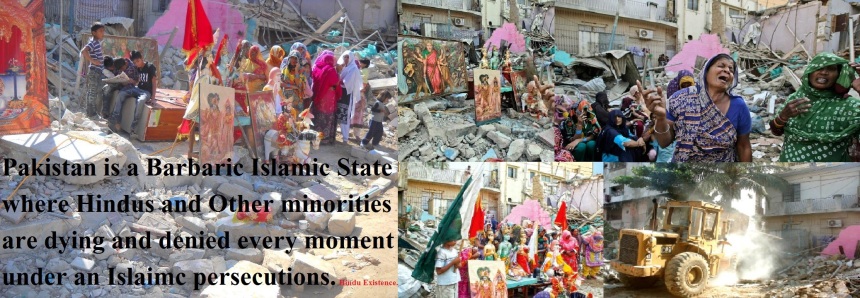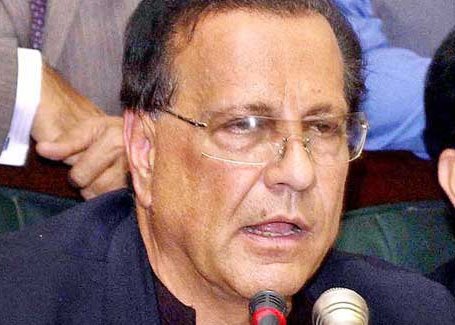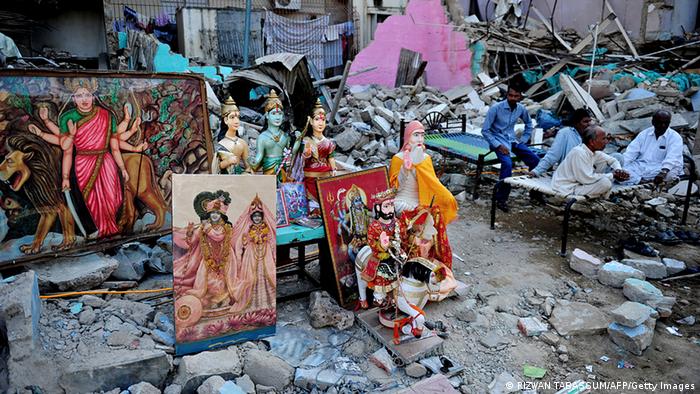http://ahmadiyyatimes.blogspot.com
The case of Salman Taseer’s murder points to the gravity of the situation. More than 500 Muslim clerics came out publicly justifying the governors’ assassination and praising his murderer, Malik Mumtaz Qadri. Pakistani lawyers showered flowers on Qadri when he was brought in a police van before an Islamabad court.
Last Saturday, Shri Rama Pir Mandir, a century-old Hindu temple in Soldier Bazaar in Karachi, along with surrounding houses of the Hindus, was destroyed by the authorities. Although the Sindh High Court is hearing a petition on the matter, Karachi police denied the existence of the temple altogether.

Of course, this is not the first time the Hindus have been targeted in Pakistan. Pakistan Hindu Council contends that more than 50 Hindu families are migrating to India every month due to the persecution they face in Pakistan. Even though the case of forced conversion and marriage of a Hindu girl, Rinkle Kumari attracted a lot of media attention earlier this year, not much has changed on the ground. Those staying there live under the constant threat of forced conversions, demolition and desecration of temples, kidnapping for ransom and demands for protection money. This year during the month of Ramzan, Maya Khan, a popular TV anchor, converted, with great personal pride, a Hindu boy on her live show at ARY. Rather than being denounced, such forced conversions are now being celebrated.

But it is not the Hindus alone that suffer from persecution in Pakistan. The other religious minority, Christians are no better off. Numerous incidents of land-grabbing of churches and missionary hospitals, and of burning down of churches have been reported in the recent years but no action has been taken by the government. Then are the charges of blasphemy slapped against the Christians, the most famous being that against Aasia Bibi, a Christian mother of four. The governor of Punjab, Salman Taseer, was last year shot dead by his own bodyguard for supporting Aasia Bibi, who was sentenced to death on charges of blasphemy. Like him, Minority Affairs Minister Shahbaz Bhatti, the only Christian in Pakistan’s cabinet, was murdered for seeking reform of Pakistan’s blasphemy laws.

The case of Salman Taseer’s murder points to the gravity of the situation. More than 500 Muslim clerics came out publicly justifying the governors’ assassination and praising his murderer, Malik Mumtaz Qadri. Pakistani lawyers showered flowers on Qadri when he was brought in a police van before an Islamabad court. Most interestingly, Qadri’s team of defence lawyers is led by former chief justice of the Lahore High Court, Khwaja Muhammad Sharif. As Chief Justice, he had, in March 2010, accused Pakistani Hindus of “involvement in funding terrorism” in that country. Others may not have been so vocal, but the actions of the Pakistan Supreme Court in Rinkle Kumari case again brought home the prejudice against minorities in the judiciary.
If discrimination against Hindus and Christians can be understood as being rooted in the founding ideology of Pakistan, the case of Ahmedis is a bit different. Responding to long-standing demands, when Prime Minister ZA Bhutto introduced a law in 1974 which declared Ahmedis as non-Muslim. Pakistan’s only Nobel laureate, Abdus Salam, who also worked on Pakistani nuclear programme, is not remembered in that country because he was an Ahmedi. He left for England in 1974 after Pakistan declared Ahmedis as non-Muslim. After his death in 1996, his body was brought to Pakistan and buried next to his parents’ graves in the city of Rabwah. The epitaph on his grave initially read ‘First Muslim Nobel Laureate’, but a Pakistani court later ordered that the word ‘Muslim’ be removed, leaving the nonsensical description ‘First [blank] Nobel Laureate’.
What started with non-Muslims in Pakistan has now reached the Shias. A Pew Survey from August showed that only 50 per cent of Pakistanis consider Shias as Muslims. News reports say that more Shias have been killed in Pakistan this year than in any previous year. In typical Pakistani style, the main anti-Shia group Lashkar-e-Jhangvi has reincarnated itself as Ahle-Sunnat Wal Jamaat and is operating with impunity. Hazaras in Balochistan and Shias in Gilgit-Baltistan have been the primary targets of jehadi groups. The real extent of brutality is never known as these areas are out of bounds for both local and foreign journalists.
For all the pontification about human rights and the Right to Protect elsewhere, the world seems unusually silent about what is happening inside Pakistan. The US, which needs Pakistan’s help for an honourable exit from Afghanistan, is turning a blind eye. It did the same when Pakistan army carried out a genocide in Bangladesh (then East Pakistan). For other Western countries, Pakistan is just another far-away lawless land like Somalia or Congo where people are mindlessly killing each other. But what is India’s excuse?






No comments:
Post a Comment